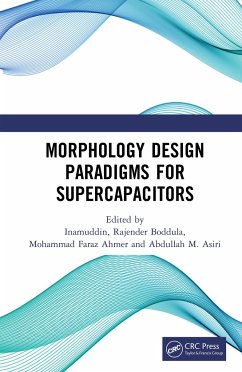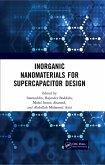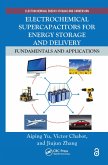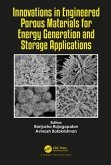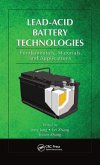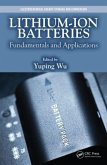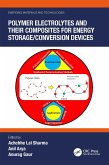Morphology Design Paradigms for Supercapacitors
Herausgeber: Inamuddin; Ahmer, Mohammad Faraz; Boddula, Rajender
Morphology Design Paradigms for Supercapacitors
Herausgeber: Inamuddin; Ahmer, Mohammad Faraz; Boddula, Rajender
- Gebundenes Buch
- Merkliste
- Auf die Merkliste
- Bewerten Bewerten
- Teilen
- Produkt teilen
- Produkterinnerung
- Produkterinnerung
Depicts the latest advances in the improvement of supercapacitors due to the incorporation of nanomaterials into the design; from zero-dimensional to three-dimensional, and microporous to mesoporous. Coverage includes basic comprehension of capacitive practices at sub-atomic and nanoscales to enhance device performance.
Andere Kunden interessierten sich auch für
![Inorganic Nanomaterials for Supercapacitor Design Inorganic Nanomaterials for Supercapacitor Design]() Inorganic Nanomaterials for Supercapacitor Design223,99 €
Inorganic Nanomaterials for Supercapacitor Design223,99 €![Electrochemical Supercapacitors for Energy Storage and Delivery Electrochemical Supercapacitors for Energy Storage and Delivery]() Aiping YuElectrochemical Supercapacitors for Energy Storage and Delivery346,99 €
Aiping YuElectrochemical Supercapacitors for Energy Storage and Delivery346,99 €![Innovations in Engineered Porous Materials for Energy Generation and Storage Applications Innovations in Engineered Porous Materials for Energy Generation and Storage Applications]() Innovations in Engineered Porous Materials for Energy Generation and Storage Applications246,99 €
Innovations in Engineered Porous Materials for Energy Generation and Storage Applications246,99 €![Green Energy Materials Handbook Green Energy Materials Handbook]() Green Energy Materials Handbook236,99 €
Green Energy Materials Handbook236,99 €![Lead-Acid Battery Technologies Lead-Acid Battery Technologies]() Lead-Acid Battery Technologies265,99 €
Lead-Acid Battery Technologies265,99 €![Lithium-Ion Batteries Lithium-Ion Batteries]() Lithium-Ion Batteries257,99 €
Lithium-Ion Batteries257,99 €![Polymer Electrolytes and their Composites for Energy Storage/Conversion Devices Polymer Electrolytes and their Composites for Energy Storage/Conversion Devices]() Polymer Electrolytes and their Composites for Energy Storage/Conversion Devices192,99 €
Polymer Electrolytes and their Composites for Energy Storage/Conversion Devices192,99 €-
-
-
Depicts the latest advances in the improvement of supercapacitors due to the incorporation of nanomaterials into the design; from zero-dimensional to three-dimensional, and microporous to mesoporous. Coverage includes basic comprehension of capacitive practices at sub-atomic and nanoscales to enhance device performance.
Produktdetails
- Produktdetails
- Verlag: Taylor & Francis
- Seitenzahl: 244
- Erscheinungstermin: 16. Januar 2020
- Englisch
- Abmessung: 234mm x 156mm x 16mm
- Gewicht: 540g
- ISBN-13: 9780367207540
- ISBN-10: 0367207540
- Artikelnr.: 58619175
- Verlag: Taylor & Francis
- Seitenzahl: 244
- Erscheinungstermin: 16. Januar 2020
- Englisch
- Abmessung: 234mm x 156mm x 16mm
- Gewicht: 540g
- ISBN-13: 9780367207540
- ISBN-10: 0367207540
- Artikelnr.: 58619175
Dr. Inamuddin is currently working as an Assistant Professor in the Chemistry Department, Faculty of Science, King Abdulaziz University, Jeddah, Saudi Arabia. He is a permanent faculty member (Assistant Professor) at the Department of Applied Chemistry, Aligarh Muslim University, Aligarh, India. He obtained Master of Science degree in Organic Chemistry from Chaudhary Charan Singh (CCS) University, Meerut, India, in 2002. He received his Master of Philosophy and Doctor of Philosophy degrees in Applied Chemistry from Aligarh Muslim University (AMU), India, in 2004 and 2007, respectively. He has extensive research experience in multidisciplinary fields of Analytical Chemistry, Materials Chemistry, and Electrochemistry and, more specifically, Renewable Energy and Environment. His research interests include ion exchange materials, a sensor for heavy metal ions, biofuel cells, supercapacitors, and bending actuators. Dr. Rajender Boddula is currently working for the Chinese Academy of Sciences-President's International Fellowship Initiative (CAS-PIFI) atthe National Center for Nanoscience and Technology (NCNST, Beijing). His specialized research areas focus on energy conversion and storage, including nanomaterials, graphene, polymer composites, heterogeneous catalysis, photoelectrocatalytic water splitting, biofuel cell, and supercapacitors. Dr. Mohammad Faraz Ahmer is presently working as an Assistant Professor in the Department of Electrical Engineering, Mewat Engineering College, Nuh Haryana, India. He completed M.Tech. (2009) and Bachelor of Engineering (2007) degrees in Electrical Engineering in Aligarh Muslim University, Aligarh, in the first division. He obtained a Ph.D. degree in 2016 on his thesis entitled "Studies on Electrochemical Capacitor Electrodes." His scientific interests include electrospun nanocomposites and supercapacitors. He is actively engaged in searching of new methodologies involving the development of organic composite materials for energy storage systems. Prof. Abdullah M. Asiri has been the Head of the Chemistry Department at King Abdulaziz University in Jeddah, Saudi Arabia, since October 2009, and he is the founder and the Director of the Center of Excellence for Advanced Materials Research (CEAMR). He is the Professor of Organic Photochemistry. He graduated from King Abdulaziz University (KAU) with B.Sc. in Chemistry in 1990 and gained a Ph.D. from University of Wales, College of Cardiff, U.K. in 1995. His research interest covers color chemistry, synthesis of novel photochromic and thermochromic systems, synthesis of novel coloring matters and dyeing of textiles, materials chemistry, nanochemistry and nanotechnology, and polymers and plastics. A major achievement of Prof. Asiri is the discovery of tribochromic compounds, a new class of compounds which change from slightly or colorless to deep colored when subjected to small pressure or grinding.
1. Zero-Dimensional Carbon Nanostructures for Supercapacitors
2. One-Dimensional Nanomaterials for Supercapacitors
3. Core-Shell Nanomaterials for Supercapacitors
4. Hierarchical Nanostructures for Supercapacitors
5. Vertically Aligned 1D and 2D Nanomaterials for High-Frequency
Supercapacitors
6. Mesoporous Electrodes for Supercapacitors
7. Honeycomb Nanostructures for Supercapacitors
8. Chemical Synthesis of Hybrid Nanoparticles Based on Metal-Metal Oxide
Systems
9. Inorganic One-Dimensional Nanomaterials for Supercapacitor Electrode
Applications
10. One-Dimensional Carbon Nanostructures for Supercapacitors
2. One-Dimensional Nanomaterials for Supercapacitors
3. Core-Shell Nanomaterials for Supercapacitors
4. Hierarchical Nanostructures for Supercapacitors
5. Vertically Aligned 1D and 2D Nanomaterials for High-Frequency
Supercapacitors
6. Mesoporous Electrodes for Supercapacitors
7. Honeycomb Nanostructures for Supercapacitors
8. Chemical Synthesis of Hybrid Nanoparticles Based on Metal-Metal Oxide
Systems
9. Inorganic One-Dimensional Nanomaterials for Supercapacitor Electrode
Applications
10. One-Dimensional Carbon Nanostructures for Supercapacitors
1. Zero-Dimensional Carbon Nanostructures for Supercapacitors
2. One-Dimensional Nanomaterials for Supercapacitors
3. Core-Shell Nanomaterials for Supercapacitors
4. Hierarchical Nanostructures for Supercapacitors
5. Vertically Aligned 1D and 2D Nanomaterials for High-Frequency
Supercapacitors
6. Mesoporous Electrodes for Supercapacitors
7. Honeycomb Nanostructures for Supercapacitors
8. Chemical Synthesis of Hybrid Nanoparticles Based on Metal-Metal Oxide
Systems
9. Inorganic One-Dimensional Nanomaterials for Supercapacitor Electrode
Applications
10. One-Dimensional Carbon Nanostructures for Supercapacitors
2. One-Dimensional Nanomaterials for Supercapacitors
3. Core-Shell Nanomaterials for Supercapacitors
4. Hierarchical Nanostructures for Supercapacitors
5. Vertically Aligned 1D and 2D Nanomaterials for High-Frequency
Supercapacitors
6. Mesoporous Electrodes for Supercapacitors
7. Honeycomb Nanostructures for Supercapacitors
8. Chemical Synthesis of Hybrid Nanoparticles Based on Metal-Metal Oxide
Systems
9. Inorganic One-Dimensional Nanomaterials for Supercapacitor Electrode
Applications
10. One-Dimensional Carbon Nanostructures for Supercapacitors

